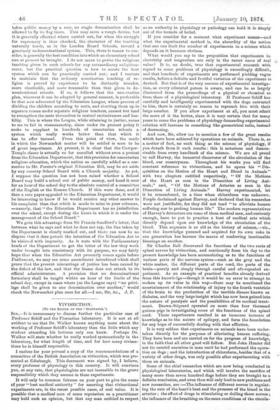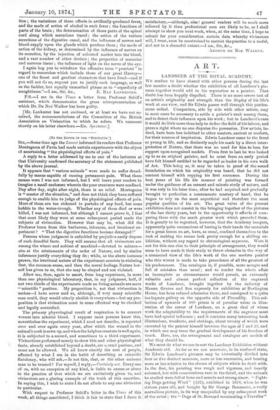VIVISECTION.
[TO THE EDITOR or THE "SPECTATOR."] Slit,-It is unnecessary to discuss further the particular case of Professor Schiff and the Florentine laboratory. It is not at all evident to me that Dr. Walker knows anything more about the working of Professor Schiff's laboratory than the little which any student attending his lectures only can know. Perhaps Dr. Walker will state whether he really worked systematically in the laboratory, for what length of time, and for how many vivisec- tions he is himself responsible.
I enclose for your perusal a copy of the recommendations of a committee of the British Association on vivisection, which was pre- sented at Edinburgh. This document was signed by, I believe, every professor of physiology in this country. It will convince you, at any rate, that physiologists are not insensible to the grave responsibility which they assume in these experiments.
It will only be common fairness on your part to give the name of your "beet medical authority" for asserting that vivisectional experiments are, in the rarest possible cases, of real value. It is possible that a medical man of some reputation as a practitioner may hold such an opinion, but that any man entitled to respect
as an authority in physiology or pathology can hold it is simply out of the bounds of belief.
If you consider for a moment what experiment means—and what the experimental method is, the absurdity of the notion that one can limit the number of experiments in a science which depends on it becomes obvious.
What would you say to the proposition that experiments in. electricity and magnetism are only in the rarest cases of real value? It is, no doubt, true that experimental research with regard to some problems of physiology is exceedingly difficult, and that hundreds of experiments are performed yielding vague- results, before a definite and fruitful variation of the experiment is- devised. But that is of the very essence of experimental investiga- tion, as every educated person is aware, and can be as largely illustrated from the proceedings of a physical or chemical as- from those of a physiological laboratory. If Professor Schiff has- carefully and intelligently experimented with the dogs entrusted to him, there is certainly no reason to reproach him with their large number. If you allow experiment at all, you must admit the more of it the better, since it is very certain that for many years to come the problems of physiology demanding experimental solution will increase in something like geometrical ratio, instead of decreasing.
And now, Sir, allow me to mention a few of the great results
- which have been achieved by operations on animals. There is, as- a matter of fact, no such thing as the science of physiology, if you detach from it such results : this is notorious and demon- strable from every handbook of the science: We are all proud to call Harvey, the immortal discoverer of the circulation of the blood, our countryman. Throughout his works you will find. constant reference to vivisections, and he opens his "Dis- quisition on the Motion of the Heart and Blood in Animals" with two chapters entitled respectively, " Of the Motions- of the Heart as seen in the Dissection of Living Ani- mals," and, " Of the Motions of Arteries as seen in the- Dissection of Living Animals." Harvey experimented, let it be remembered, in a time when chloroform was unknown. People declaimed against Harvey, and declared that his researches- were not justifiable, for they did not tend "to alleviate human, suffering nor to prolong human life." The modern representatives of Harvey's detractors are some of them medical men, and curiously enough, have to put in practice a host of medical arts which directly depend upon our knowledge of the circulation of the blood. This sequence is as old as the history of science,—viz.„ that the knowledge pursued and acquired for its own sake in one generation has become the means of conferring inestimable blessings on another.
Sir Charles Bell discovered the functions of the two roots of spinal nerves by vivisection, and continually from his day to the present knowledge has been accumulating as to the functions of various parts of the nervous system—such as the grey and the- white matter, the different parts of the cord, the parts of the- brain—purely and simply through careful and oft-repeated ex- periment. As an example of practical benefits already derived from this knowledge—though it would be an error to attempt to reckon up its value in this way—there may be mentioned the- ascertainment of the relationship of injury to the fourth ventricle- of the brain to the production of the terrible disease known as diabetes, and the very large insight which has now been gained into, the nature of paralysis and the possibilities of its medical treat- ment. Brown-Sequard operated on more than four thousand guinea-pigs in investigating some of the functions of the spinal. cord. These experiments resulted in an immense increase of knowledge as to the nature of epilepsy, and form the foundation. for any hope of successfully dealing with that affliction.
It is very seldom that experiments on animals have been under- taken directly for the purposes of alleviating human suffering. They have been and are carried on for the progress of knowledge, in the faith that all other good will follow. But John Hunter did not tie carotid aneurism in man until he had performed the opera- tion on dogs ; and the introduction of chloroform, besides that of a variety of other drugs, was only possible after experimenting with them on animals.
Some of the chief researches which are now being conducted in physiological laboratories, and which will involve the sacrifice of many more than seven hundred dogs before they are brought to a definite conclusion, and even then will only lead to new problems and new researches, are :—The influence of different nerves in regulat- ing the rate of the heart's beat and the pressure of the blood in the arteries ; the effect of drugs in stimulating or dulling those nerves ; the influence of the breathing on the same conditions of the circula-
tion ; the variations of these effects in artifically-produced fever, and the mode of action of alcohol in such fever ; the functions of parts of the brain ; the determination of those parts of the spinal cord along which sensations travel ; the action of the various secretions of the digestive canal, and the influence of nerves and blood-supply upon the glands which produce them ; the mode of action of the kidney, as determined by the influence of nerves on its secretion, by the injection of coloured matter into the blood, and a vast number of other devices ; the properties of muscular and nervous tissue ; the influence of light on the nerve of the eye. I again beg you to withdraw the offensive term "prurient" in regard to researches which include those of our great Harvey- -one of the finest and gentlest characters that have lived—and if you will not do so, request you to justify such language, as well as the feebler, but equally unmerited phrase as to "superfluity of
naughtiness."—I am, Sir, &c., E. RAY LANKESTER. P.S.—I see in the Times a letter, from Professor Schiff's assistant, which demonstrates the gross misrepresentation of which Dr. De Noe Walker has been guilty.
[Mr. Lankester has not enclosed, or at least we have not re- ceived, the recommendations of the Committee of the British Association on Vivisection to which he refers. We comment shortly on his letter elsewhere.—En. Spectator.]



































 Previous page
Previous page